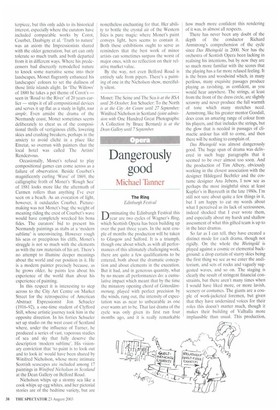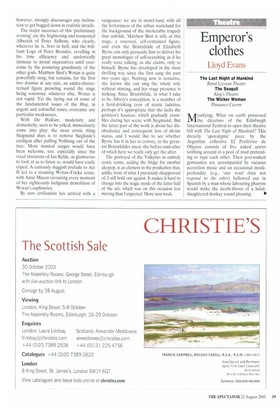Dangerously good
Michael Tanner
The Ring Edinburgh Festival Dominating the Edinburgh Festival this year are two cycles of Wagner's Ring, which Scottish Opera has been building up over the past three years. In the next couple of months the production will be taken to Glasgow and Salford. It is a triumph, though one about which, as with all performances of this ultimately challenging work, there are quite a few qualifications to be entered, both about the dramatic conception and about elements in the execution. But it had, and in generous quantity, what by no means all performances do: a cumulative impact which meant that by the time the minatory opening chord of G6tterdammerung, played with perfect precision by the winds, rang out, the intensity of expectation was as near to unbearable as one ever wants art to be. That last drama of the cycle was only given its first run four months ago, and it is really remarkable
how much more confident this rendering of it was, in almost all respects.
There has never been any doubt of the depth of the conductor Richard Armstrong's comprehension of the cycle since Das Rheingold in 2000. Nor has the orchestra of Scottish Opera been lacking in realising his intentions, but by now they are so much more familiar with the scores that the playing has a far more relaxed feeling. It is the brass and woodwind which, in many perilous, many exquisite passages produce playing as ravishing, as confident, as you would hear anywhere. The strings, at least from the front of the dress circle, are slightly scrawny and never produce the full warmth of tone which many stretches need. Armstrong, like his greater mentor Goodall, does COX( an amazing range of colour from his players, and that includes the strings, but the glow that is needed in passages of climactic ardour has still to come, and then there will be nothing to complain of.
Das Rheingold was almost dangerously good. The huge span of drama was delivered in such huge paragraphs that it seemed to be over almost too soon. And the production of Tim Albery, obviously working in the closest association with the designer Hildegard Bechtler and the costume designer Ana Jebens, I now see as perhaps the most insightful since at least Kupfer's in Bayreuth in the late 1980s. I'm still not sure about quite a few things in it, but I am happy to eat my words about what I perceived as its lack of seriousness, indeed shocked that I ever wrote them, and especially about my harsh and shallow assessment of what this gifted team is up to in the later dramas.
So far as I can tell, they have created a distinct mode for each drama, though not rigidly. On the whole the Rheingold is played against a cosmic or elemental background: a drop curtain of starry skies being the first thing we see as we enter the auditorium, and sets of rocks and vaguely suggested waves, and so on. The staging is clearly the result of stringent financial constraints, but there aren't many times when 1 would have liked more, or more lavish, scenery or costumes. The giants are a couple of work-jacketed foremen, but given that they have undersized voices for their roles this doesn't matter much, though it makes their building of Valhalla more implausible than usual. This production,
however, strongly discourages any inclination to get bogged down in realistic details.
The major successes of this 'preliminary evening' are the frightening and tormented Alberich of Peter Sidhom, who clearly, wherever he is, lives in hell; and the brilliant Loge of Peter Bronder, revelling in his lone efficiency and sardonically immune to moral imperatives until overcome by the posturing grandiosity of the other gods. Matthew Best's Wotan is quite powerfully sung, but remains, for the first two dramas at any rate, an under-characterised figure prowling round the stage being sonorous; whatever else, Wotan is not vapid. Yet the laying out of some of the fundamental issues of the Ring, in urgent and colourful tones, overcame any particular weaknesses.
With Die Walkiire, modernity and domesticity, seen to be yoked, immediately come into play: the most erotic thing Siegmund does is to remove Sieglinde's cardigan after pulling Nothung out of the tree. More musical surges would have been welcome, too, especially since the vocal resources of Jan Kyhle, as glamorous to look at as to listen to, would have easily coped. A curiously sluggish prelude to Act II led to a stunning Wotan—Fricka scene, with Anne Mason savouring every moment of her righteously indignant demolition of Wotan's sophistries.
By now civilisation has arrived with a vengeance; we are in motel-land, with all the forlornness of the urban wasteland for the background of the intolerable tragedy that unfolds. Matthew Best is still, at this stage, a reserved, self-contained figure, and even the Briinnhilde of Elizabeth Byrne can only persuade him to deliver his great monologue of self-searching as if he really were talking, as she claims, only to himself. Byrne has developed in the most thrilling way since she first sang the part two years ago. Nothing now is tentative, she knows she can sing the whole role without stinting, and her stage presence is striking. Since Briinnhilde, in what I take to be Albery's conception, is a member of a hard-drinking crew of manic ladettes, perhaps it's appropriate that she lacks the goddess's hauteur, which gradually crumbles during her scene with Siegmund. But the latter part of the work is about her disobedience and consequent loss of divine status, and I would like to see whether Byrne has it in her to convey, as the greatest Brtinnhildes must, the before-and-after of which here we really only get the after.
The portrayal of the Valkyries in entirely comic terms, raiding the fridge for another alcopop, is an element in the production that, unlike most of what I previously disapproved of, I still hold out against. It makes it hard to change into the tragic mode of the latter half of the act, which was on this occasion less moving than I expected. More next week.



























































 Previous page
Previous page